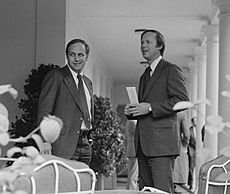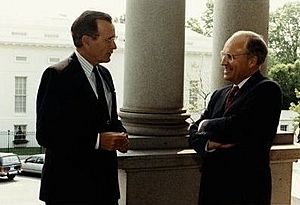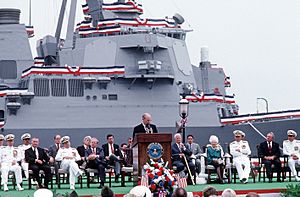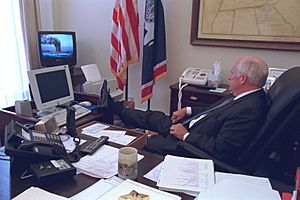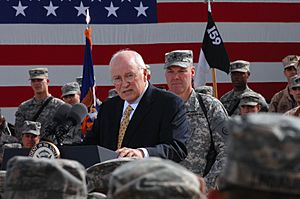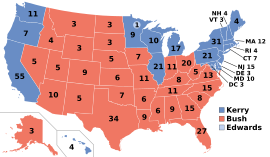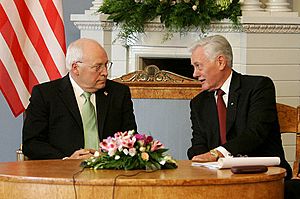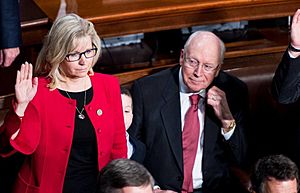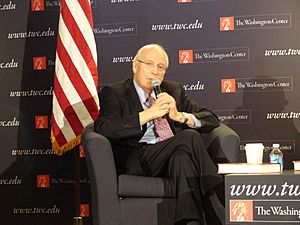Dick Cheney facts for kids
Quick facts for kids
Dick Cheney
|
|
|---|---|
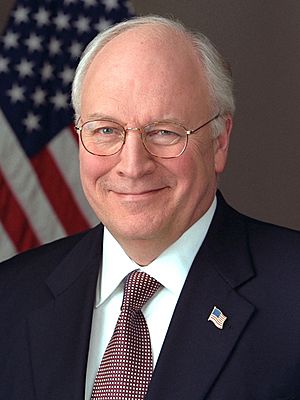
Official portrait, 2004
|
|
| 46th Vice President of the United States | |
| In office January 20, 2001 – January 20, 2009 |
|
| President | George W. Bush |
| Preceded by | Al Gore |
| Succeeded by | Joe Biden |
| 17th United States Secretary of Defense | |
| In office March 21, 1989 – January 20, 1993 |
|
| President | George H. W. Bush |
| Deputy | Donald J. Atwood Jr. |
| Preceded by | Frank Carlucci |
| Succeeded by | Les Aspin |
| House Minority Whip | |
| In office January 3, 1989 – March 20, 1989 |
|
| Leader | Robert H. Michel |
| Preceded by | Trent Lott |
| Succeeded by | Newt Gingrich |
| Chair of the House Republican Conference | |
| In office June 4, 1987 – January 3, 1989 |
|
| Leader | Robert H. Michel |
| Preceded by | Jack Kemp |
| Succeeded by | Jerry Lewis |
| Member of the U.S. House of Representatives from Wyoming's at-large district |
|
| In office January 3, 1979 – March 20, 1989 |
|
| Preceded by | Teno Roncalio |
| Succeeded by | Craig L. Thomas |
| 7th White House Chief of Staff | |
| In office November 21, 1975 – January 20, 1977 |
|
| President | Gerald Ford |
| Preceded by | Donald Rumsfeld |
| Succeeded by | Hamilton Jordan (1979) |
| White House Deputy Chief of Staff | |
| In office December 18, 1974 – November 21, 1975 |
|
| President | Gerald Ford |
| Preceded by | Position established |
| Succeeded by | Landon Butler |
| Personal details | |
| Born |
Richard Bruce Cheney
January 30, 1941 Lincoln, Nebraska, U.S. |
| Political party | Republican |
| Spouse | |
| Children | |
| Education |
|
| Signature |  |
Richard Bruce Cheney ( CHAY-nee; born January 30, 1941) is an American politician and businessman who served as the 46th vice president of the United States from 2001 to 2009 under President George W. Bush. Often cited as the most powerful vice president in American history, Cheney previously served as White House Chief of Staff for President Gerald Ford, the U.S. representative for WY's At-large congressional district from 1979 to 1989, and as the 17th United States secretary of defense in the administration of President George H. W. Bush. He is the oldest living former U.S. vice president, following the death of Walter Mondale in 2021.
Contents
Early life and education
Cheney was born in Lincoln, Nebraska, the son of Marjorie Lorraine (née Dickey) and Richard Herbert Cheney. He is of predominantly English, as well as Welsh, Irish, and French Huguenot ancestry. His father was a soil conservation agent for the U.S. Department of Agriculture and his mother was a softball star in the 1930s; Cheney was one of three children. He attended Calvert Elementary School before his family moved to Casper, Wyoming, where he attended Natrona County High School.
He attended Yale University, but by his own account had problems adjusting to the college, and dropped out. Among the influential teachers from his days in New Haven was H. Bradford Westerfield, whom Cheney repeatedly credited with having helped to shape his approach to foreign policy. He later attended the University of Wyoming, where he earned both a Bachelor of Arts and a Master of Arts in political science. He subsequently started, but did not finish, doctoral studies at the University of Wisconsin–Madison.
In 1964, he married Lynne Vincent, his high school sweetheart, whom he had met at age 14.
When Cheney became eligible for the draft, during the Vietnam War, he applied for and received five draft deferments. In 1989, The Washington Post writer George C. Wilson interviewed Cheney as the next secretary of defense; when asked about his deferments, Cheney reportedly said, "I had other priorities in the '60s than military service." Cheney testified during his confirmation hearings in 1989 that he received deferments to finish a college career that lasted six years rather than four, owing to sub-par academic performance and the need to work to pay for his education. Upon graduation, Cheney was eligible for the draft, but at the time, the Selective Service System was not inducting married men. On October 26, 1965, the draft was expanded to include married men without children; Cheney's first daughter, Elizabeth, was born 9 months and two days later. Cheney's fifth and final deferment granted him "3-A" status, a "hardship" deferment available to men with dependents. In January 1967, Cheney turned 26 and was no longer eligible for the draft.
In 1966 Cheney dropped out of the doctoral program at the University of Wisconsin to work as staff aide for Governor Warren Knowles.
In 1968 Cheney was awarded an American Political Science Association congressional fellowship and moved to Washington.
Early career
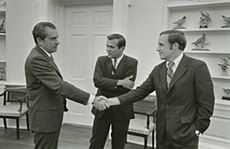
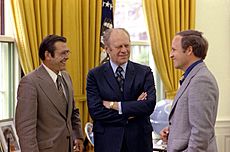
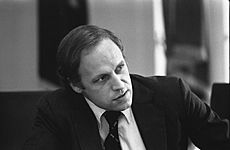
Cheney began his political career as an intern for Congressman William A. Steiger, eventually working his way into the White House during the Nixon and Ford administrations. He served as White House chief of staff from 1975 to 1977. In 1978, he was elected to the U.S. House of Representatives, and represented Wyoming's at-large congressional district from 1979 to 1989, briefly serving as House minority whip in 1989. He was appointed Secretary of Defense during the presidency of George H. W. Bush, and held the position for most of Bush's term from 1989 to 1993.
Secretary of Defense (1989–1993)
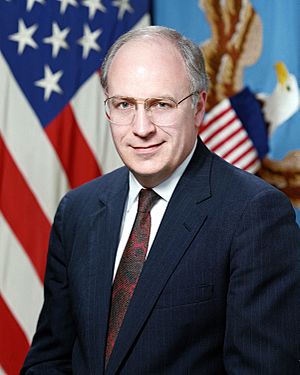
President George H. W. Bush nominated Cheney for the office of Secretary of Defense immediately after the U.S. Senate failed to confirm John Tower for that position. The senate confirmed
Cheney publicly expressed concern that nations such as Iraq, Iran, and North Korea, could acquire nuclear components after the collapse of the Soviet Union in 1991. The end of the Cold War, the fall of the Soviet Union, and the disintegration of the Warsaw Pact obliged the first Bush Administration to reevaluate the North Atlantic Treaty Organization's (NATO's) purpose and makeup. Cheney believed that NATO should remain the foundation of European security relationships and that it would remain important to the United States in the long term; he urged the alliance to lend more assistance to the new democracies in Eastern Europe.
Cheney's views on NATO reflected his skepticism about prospects for peaceful social development in the former Eastern Bloc countries, where he saw a high potential for political uncertainty and instability. He felt that the Bush Administration was too optimistic in supporting General Secretary of the CPSU Mikhail Gorbachev and his successor, Russian President Boris Yeltsin. Cheney worked to maintain strong ties between the United States and its European allies.
Cheney persuaded the Kingdom of Saudi Arabia to allow bases for U.S. ground troops and war planes in the nation. This was an important element of the success of the Gulf War, as well as a lightning-rod for Islamists, such as Osama bin Laden, who opposed having non-Muslim armies near their holy sites.
International situations
Using economic sanctions and political pressure, the United States mounted a campaign to drive Panamanian ruler General Manuel Antonio Noriega from power after he fell from favor. In May 1989, after Guillermo Endara had been duly elected President of Panama, Noriega nullified the election outcome, drawing intensified pressure. In October, Noriega suppressed a military coup, but in December, after soldiers of the Panamanian army killed a U.S. serviceman, the United States invasion of Panama began under Cheney's direction. The stated reason for the invasion was to seize Noriega to face criminal charges in the United States, protect U.S. lives and property, and restore Panamanian civil liberties. Although the mission was controversial, U.S. forces achieved control of Panama and Endara assumed the presidency; Noriega was convicted and imprisoned on racketeering charges in April 1992.
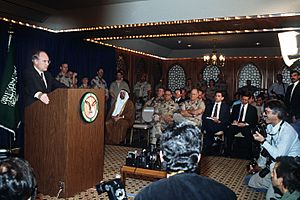
In 1991, the Somali Civil War drew the world's attention. In August 1992, the United States began to provide humanitarian assistance, primarily food, through a military airlift. At President Bush's direction, Cheney dispatched the first of 26,000 U.S. troops to Somalia as part of the Unified Task Force (UNITAF), designed to provide security and food relief. Cheney's successors as Secretary of Defense, Les Aspin and William J. Perry, had to contend with both the Bosnian and Somali issues.
Iraqi invasion of Kuwait
On August 1, 1990, Iraqi President Saddam Hussein sent the invading Iraqi forces into neighboring Kuwait, a small petroleum-rich state long claimed by Iraq as part of its territory. This invasion sparked the initiation of the Persian Gulf War and it brought worldwide condemnation. An estimated 140,000 Iraqi troops quickly took control of Kuwait City and moved on to the Saudi Arabia/Kuwait border. The United States had already begun to develop contingency plans for the defense of Saudi Arabia by the U.S. Central Command, headed by General Norman Schwarzkopf, because of its important petroleum reserves.
U.S. and world reaction
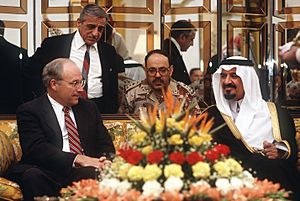
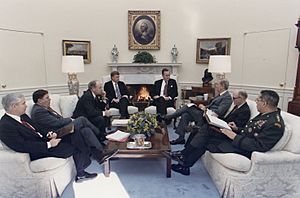
Cheney and Schwarzkopf oversaw planning for what would become a full-scale U.S. military operation. According to General Colin Powell, Cheney "had become a glutton for information, with an appetite we could barely satisfy. He spent hours in the National Military Command Center peppering my staff with questions."
Shortly after the Iraqi invasion, Cheney made the first of several visits to Saudi Arabia where King Fahd requested U.S. military assistance. The United Nations took action as well, passing a series of resolutions condemning Iraq's invasion of Kuwait; the UN Security Council authorized "all means necessary" to eject Iraq from Kuwait, and demanded that the country withdraw its forces by January 15, 1991. By then, the United States had a force of about 500,000 stationed in Saudi Arabia and the Persian Gulf. Other nations, including Britain, Canada, France, Italy, Syria, and Egypt, contributed troops, and other allies, most notably Germany and Japan, agreed to provide financial support for the coalition effort, named Operation Desert Shield.
On January 12, 1991, Congress authorized Bush to use military force to enforce Iraq's compliance with UN resolutions on Kuwait.
Military action
The first phase of Operation Desert Storm, which began on January 17, 1991, was an air offensive to secure air superiority and attack Iraqi forces, targeting key Iraqi command and control centers, including the cities of Baghdad and Basra. Cheney turned most other Department of Defense matters over to Deputy Secretary Atwood and briefed Congress during the air and ground phases of the war. He flew with Powell to the region to review and finalize the ground war plans.
After an air offensive of more than five weeks, Coalition forces launched the ground war on February 24. Within 100 hours, Iraqi forces had been routed from Kuwait and Schwarzkopf reported that the basic objective – expelling Iraqi forces from Kuwait – had been met on February 27. After consultation with Cheney and other members of his national security team, Bush declared a suspension of hostilities. On working with this national security team, Cheney has said, "there have been five Republican presidents since Eisenhower. I worked for four of them and worked closely with a fifth – the Reagan years when I was part of the House leadership. The best national security team I ever saw was that one. The least friction, the most cooperation, the highest degree of trust among the principals, especially."
Aftermath
A total of 147 U.S. military personnel died in combat, and another 236 died as a result of accidents or other causes. Iraq agreed to a formal truce on March 3, and a permanent cease-fire on April 6.
Vice presidency (2001–2009)
In July 2000, Cheney was chosen by presumptive Republican presidential nominee George W. Bush as his running mate in the 2000 presidential election. They defeated their Democratic opponents, incumbent vice president Al Gore and senator Joe Lieberman. In 2004, Cheney was reelected to his second term as vice president with Bush as president, defeating their Democratic opponents Senators John Kerry and John Edwards. During Cheney's tenure as vice president, he played a leading behind-the-scenes role in the George W. Bush administration's response to the September 11 attacks and coordination of the Global War on Terrorism. He was an early proponent of invading Iraq. Cheney was often criticized for the Bush administration's policies regarding the campaign against terrorism.
Cheney ended his vice presidential tenure as an unpopular figure in American politics with an approval rating of 13 percent. His peak approval rating in the wake of the September 11 attacks was 68 percent.
First term (2001–2005)
Following the September 11, 2001, attacks, Cheney remained physically apart from Bush for security reasons. For a period, Cheney stayed at a variety of undisclosed locations, out of public view. Cheney later revealed in his memoir In My Time that these "undisclosed locations" included his official vice presidential residence, his home in Wyoming, and Camp David. He also utilized a heavy security detail, employing a motorcade of 12 to 18 government vehicles for his daily commute from the vice presidential residence at the U.S. Naval Observatory to the White House.
On the morning of June 29, 2002, Cheney served as acting president from 7:09 a.m. to 9:24 a.m., under the terms of the 25th Amendment to the Constitution, while Bush underwent a colonoscopy.
Iraq War
Following 9/11, Cheney was instrumental in providing a primary justification for a renewed war against Iraq. Cheney helped shape Bush's approach to the "War on Terror", making numerous public statements alleging Iraq possessed weapons of mass destruction, and making several personal visits to CIA headquarters, where he questioned mid-level agency analysts on their conclusions. Cheney continued to allege links between Saddam Hussein and al-Qaeda, even though President Bush received a classified President's Daily Brief on September 21, 2001, indicating the U.S. intelligence community had no evidence linking Saddam Hussein to the September 11 attacks and that "there was scant credible evidence that Iraq had any significant collaborative ties with Al Qaeda." Furthermore, in 2004, the 9/11 Commission concluded that there was no "collaborative relationship" between Iraq and al-Qaeda. By 2014, Cheney continued to misleadingly claim that Saddam "had a 10-year relationship with al Qaeda."
Following the US invasion of Iraq, Cheney remained steadfast in his support of the war, stating that it would be an "enormous success story", and made many visits to the country. He often criticized war critics, calling them "opportunists" who were peddling "cynical and pernicious falsehoods" to gain political advantage while US soldiers died in Iraq. In response, Senator John Kerry asserted, "It is hard to name a government official with less credibility on Iraq [than Cheney]."
In a March 24, 2008, extended interview conducted in Ankara, Turkey, with ABC News correspondent Martha Raddatz on the fifth anniversary of the original U.S. military assault on Iraq, Cheney responded to a question about public opinion polls showing that Americans had lost confidence in the war by simply replying "So?" This remark prompted widespread criticism, including from former Oklahoma Republican Congressman Mickey Edwards, a long-time personal friend of Cheney.
Second term (2005–2009)
Bush and Cheney were re-elected in the 2004 presidential election, running against John Kerry and his running mate, John Edwards. During the election, the pregnancy of his daughter Mary and her sexual orientation as a lesbian became a source of public attention for Cheney in light of the same-sex marriage debate. Cheney has since stated that he is in favor of gay marriages personally, but that each individual U.S. state should decide whether to permit it or not.
Cheney's former chief legal counsel, David Addington, became his chief of staff and remained in that office until Cheney's departure from office. John P. Hannah served as Cheney's national security adviser.
Until his indictment and resignation in 2005, I. Lewis "Scooter" Libby Jr. served in both roles.
On the morning of July 21, 2007, Cheney once again served as acting president, from 7:16 am to 9:21 am. Bush transferred the power of the presidency prior to undergoing a medical procedure, requiring sedation, and later resumed his powers and duties that same day.
After his term began in 2001, Cheney was occasionally asked if he was interested in the Republican nomination for the 2008 elections. However, he always maintained that he wished to retire upon the expiration of his term and he did not run in the 2008 presidential primaries. The Republicans nominated Arizona Senator John McCain.
Post–vice presidency (2009–present)
The Washington Post reported in 2008 that Cheney purchased a home in McLean, Virginia, part of the Washington suburbs, which he was to tear down for a replacement structure. He also maintains homes in Wyoming and on Maryland's Eastern Shore.
Political activity
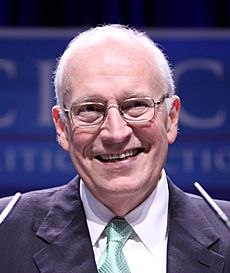
In July 2012, Cheney used his Wyoming home to host a private fundraiser for Republican presidential candidate Mitt Romney, which netted over $4 million in contributions from attendees for Romney's campaign.
Cheney is the subject of the documentary film The World According to Dick Cheney, which premiered March 15, 2013, on the Showtime television channel. Cheney was also reported to be the subject of an HBO television mini-series based on Barton Gellman's 2008 book Angler and the 2006 documentary The Dark Side, produced by the Public Broadcasting Service.
Cheney maintained a visible public profile after leaving office, being especially critical of Obama administration policies on national security. In May 2009, Cheney spoke of his support for same-sex marriage, becoming one of the most prominent Republican politicians to do so. Speaking to the National Press Club, Cheney stated: "People ought to be free to enter into any kind of union they wish, any kind of arrangement they wish. I do believe, historically, the way marriage has been regulated is at a state level. It's always been a state issue, and I think that's the way it ought to be handled today." In 2012, Cheney reportedly encouraged several Maryland state legislators to vote to legalize same-sex marriage in that state.
Although, by custom, a former vice president unofficially receives six months of protection from the United States Secret Service, President Obama reportedly extended the protection period for Cheney.
On July 11, 2009, CIA Director Leon Panetta told the Senate and House intelligence committees that the CIA withheld information about a secret counter-terrorism program from Congress for eight years on direct orders from Cheney. Intelligence and Congressional officials have said the unidentified program did not involve the CIA interrogation program and did not involve domestic intelligence activities. They have said the program was started by the counter-terrorism center at the CIA shortly after the attacks of September 11, 2001, but never became fully operational, involving planning and some training that took place off and on from 2001 until 2009. The Wall Street Journal reported, citing former intelligence officials familiar with the matter, that the program was an attempt to carry out a 2001 presidential authorization to capture or kill al Qaeda operatives.
Cheney has said that the Tea Party Movement is a "positive influence on the Republican Party" and that "I think it's much better to have that kind of turmoil and change in the Republican Party than it would be to have it outside."
In May 2016, Cheney endorsed Donald Trump as the Republican nominee in the 2016 presidential election. That November, his daughter Liz won election to the House of Representatives (to his former congressional seat). When she was sworn into office in January 2017, Cheney said he believed she would do well in the position and that he would only offer advice if requested.
That March, Cheney said that Russian interference in the 2016 United States elections could be considered "an act of war".
Memoir
In August 2011, Cheney published his memoir, In My Time: A Personal and Political Memoir, written with Liz Cheney. The book outlines Cheney's recollections of 9/11, the War on Terrorism, the 2001 War in Afghanistan, the run-up to the 2003 Iraq War, and other events.
Exceptional: Why the World Needs a Powerful America
In 2015, Cheney published another book, Exceptional: Why the World Needs a Powerful America, again co-authored with his daughter Liz. The book traces the history of U.S. foreign policy and military successes and failures from Franklin Roosevelt's administration through the Obama administration.
Legacy
In April 2007, Cheney was awarded an honorary doctorate of public service by Brigham Young University, where he delivered the commencement address.
Cheney has been cited as the most powerful vice president in American history. He has been compared to Darth Vader, a characterization originated by his critics, but which was later adopted humorously by Cheney himself as well as by members of his family and staff.
The federal building in Casper, Wyoming is named the Dick Cheney Federal Building.
Personal life
Cheney is a member of the United Methodist Church and was the first Methodist vice president to serve under a Methodist president.
Cheney's brother, Bob, is a former civil servant at the Bureau of Land Management.
His wife, Lynne, was chair of the National Endowment for the Humanities from 1986 to 1996. She is now a public speaker, author, and a senior fellow at the American Enterprise Institute.
The couple have two daughters, Elizabeth ("Liz") and Mary Cheney, and seven grandchildren. Liz, a former congresswoman from Wyoming, is married to Philip J. Perry, a former General Counsel of the Department of Homeland Security. Mary, a former employee of the Colorado Rockies baseball team and the Coors Brewing Company, was a campaign aide to the Bush re-election campaign; she lives in Great Falls, Virginia, with her wife Heather Poe. Cheney has publicly supported gay marriage since leaving the vice presidency.
As of 2015, Cheney had a pet Golden Retriever named Nelson.
Images for kids
-
Cheney meets with President Ronald Reagan, July 1983
-
Handwritten note above Joe Wilson's editorial by Cheney referring to the covert agent before the leak took place
-
Vice President Cheney speaks to the press flanked by fellow Republicans Mitch McConnell (left) and Trent Lott (right), April 2007
-
Pope Benedict XVI, Vice President Dick Cheney and Mrs. Lynne Cheney at a farewell ceremony for the Pope at John F. Kennedy International Airport in New York.
-
Vice President Cheney escorts former first lady Nancy Reagan at the commissioning ceremony of the USS Ronald Reagan, 2003
-
Cheney shakes hands with Egyptian President Hosni Mubarak at the Presidential Palace in Cairo, May 2007
-
Cheney attending the state funeral of George H. W. Bush in December 2018
See also
 In Spanish: Dick Cheney para niños
In Spanish: Dick Cheney para niños


